Episcopal-supported intentional community in Charlottesville embodies radical discipleship — and permacultureNot a commune exactly, but these young people do a lot of sharing and caringPosted Aug 18, 2017 |
|
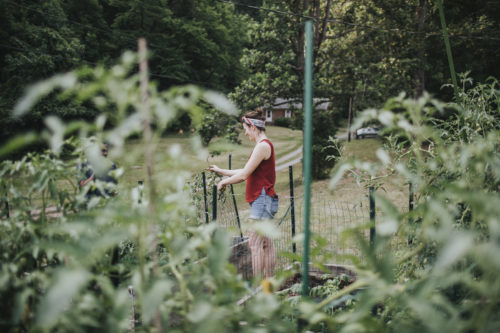
Claire Hitchins tends the food garden that supplements the diet of those living at the Charis Intentional Community, a mission of Grace Church, Red Hill, southwest of Charlottesville, Virginia. Photo: Eze Amos/For Episcopal News Service
[Episcopal News Service] In the 95-degree heat, a young, bearded white man wearing a hat with a “Black Lives Matter” pin sprawls on a lawn chair past the graveled driveway of the house nestled in a valley off Monacan Trail Road southwest of Charlottesville, Virginia. A rainbow of origami cranes strung together like garland hovers between two posts behind him. When a visitor approaches, he stretches as he gets up and leads her through the front door, where young people huddle in a colorful living room packed with books and art.
Within the hour, the house and lawn will fill with more than 30 people, bringing chatter, singing, children’s laughter, a strumming banjo and serious conversations — along with the salads, enchiladas, quiches and cookies of a casual summer potluck party.
This is home base for the Charis Community. Pronounced kaar-is, Charis means “grace” in ancient Greek.
Cofounded in 2015 by Episcopal youth leader Grace Aheron and the Rev. Neal Halvorson-Taylor of Grace Church, Red Hill, the Charis Community is a gathering of people living together under the shared values of simplicity, prayer and hospitality. This intentional Christian community is housed at an unused Episcopal Church property. The eight acres owned by the Diocese of Virginia include a small cobblestone church, a ranch-style house, a food garden and a forest of tulip poplars and dogwoods. The Charis Community is a partnership with Grace Church, a nearby mission parish. This Charis mission is supported by the church’s vestry, and members keep in contact with Halvorson-Taylor weekly on an informal basis.
The Charis Community idea formed through a connection followed by discussions and prayer. Halvorson-Taylor is married to Aheron’s Hebrew professor at the University of Virginia, and they got in touch a year after Aheron graduated and was living in San Francisco. Halvorson-Taylor knew of this property no one was using.
“I felt like God was calling me to go and do this in Charlottesville. It took me a long time to figure that out. We were in conversations for months,” Aheron said.
Trusting in the transformation of the spirit, the young adults living at Charis are discerning their vocational call, sitting in the tensions of injustice and inviting others into the journey.
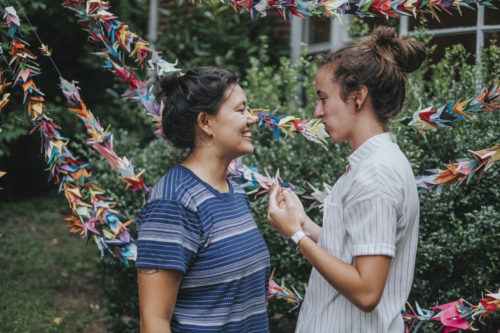
Charis cofounder Grace Aheron and partner Rowan Hollins chat at the potluck party in front of the garland of origami cranes created in support for people of color, hanging outside the intentional community’s home south of Charlottesville, Virginia. Photo: Eze Amos/For Episcopal News Service
“We understand that all of what we do is interconnected, from the radical activism to the ecological,” said Claire Hitchins, 26, a musician and one of the five long-term residents.
These young adults share an explicit passion “to respond to our context of empire, capitalism, and alienation, along with the environmental and social destruction that those forces perpetuate,” according to the community’s official mission statement. They want to model Jesus’ vision of community, resist society’s violence and accompany each other on their individual journeys of discipleship and growth.
An intentional community can take many forms, but it always involves a group of people living together with a clear mission. While a commune usually means all individual resources are pooled and shared, other intentional communities share only some of their resources.
Charis housemates share chores posted on the refrigerator, including gardening, tending chickens and bees and general household upkeep. They contribute monthly to a fund for the house’s food and supplies, and they maintain an account at a credit union for house bills. Once or twice a week, they join for a morning prayer, also considered an open-faith meditation. There’s no discrimination based on religion, color, culture, race, ancestry, sexual orientation, disability, gender or gender expression. And they dine together at a weekly community meal, where they have a meeting to address projects — some ecological, others outreach-based.
A monastery is yet another type of intentional community. Monasteries are cloistered from the outside world to varying degrees and require members to take religious vows. But many kinds of intentional communities don’t fall along these lines. The Episcopal Service Corps helps develop and support a network of 26 intentional communities from Hawaii to New Hampshire, united by shared values of service, justice and prayer. Charis isn’t listed under this network but resembles this style.
Located on land where the Monacan Indian Nation lived centuries earlier, according to the Virginia Foundation for the Humanities, the Charis Community comprises people in their 20s and early 30s who are devoted to radical discipleship. They share a belief in the importance of hospitality, outreach and permaculture.
Hospitality within and beyond
The friendly, generous reception of visitors to the Charis home is a Christian act, and it’s something members take seriously. This place is a refuge for people in need of moral support, safety from tenuous living situations and hope for a better future.
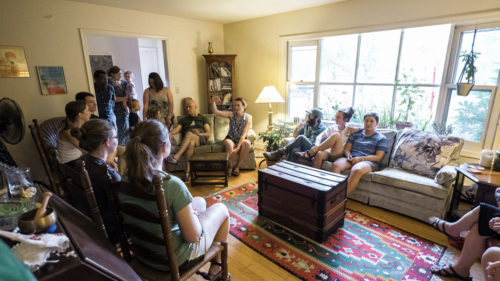
Friends, parishioners and fellow activists gather at the Charis Community home south of Charlottesville, Virginia, for a monthly potluck party. Photo: Eze Amos/For Episcopal News Service
People flock to their monthly potlucks, where it’s tradition to start the meal with a song. David Slezak, 70, arrived at the July potluck bearing his organic beef cabbage rolls, a family recipe. Slezak is a parishioner and singer at St. Paul’s Memorial Church at the University of Virginia and manager of Haven Kitchen, a homeless shelter kitchen. He also attended the Charis sunrise Easter service and brunch, along with about 75 other people.
He’s inspired by Aheron’s leadership and energy. “She’s an Episcopal powerhouse,” he said. “I’ve been just so moved by Grace and her work.”
Short-term residential guests at Charis may be experiencing housing insecurity because they can’t afford market-rate rentals, they recently arrived in the Charlottesville community, were released from the hospital or from prison, and or their family is in transition from divorce, domestic violence or ending foster care.
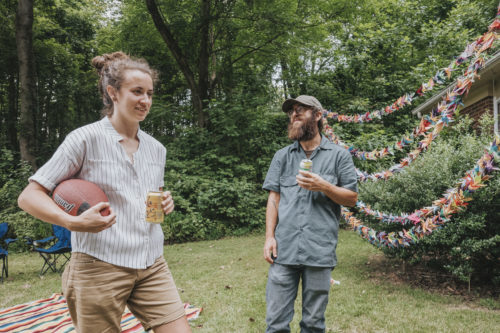
Charis housemates Rowan Hollins and Mark Heisey relax at the monthly potluck party outside the house where the Christian intentional community resides south of Charlottesville, Virginia. Photo: Eze Amos/For Episcopal News Service
They could be anyone from single parents with low-wage jobs who experience a crisis to former refugees whose formal support has ended, said Mark Heisey, 29, the bearded guy from the front lawn, as he, Aheron and Hitchins gave a tour of the house.
Hospitality plays a role in a larger sense too — especially considering the violence and upheaval in the larger Charlottesville community after the summer’s white supremacy rallies protesting the removal of Confederate statues.
“We want to help Charlottesville become more hospitable to people for whom conditions have become inhospitable,” said Ann Marie Smith, a Buddhist-Christian and member of Grace Church who attended the potluck. She leads weekly meditation sessions in the Charis living room.
Outreach in times of peace and trouble
The property can feel like a secluded haven where tomato leaves rustle and crickets sing. But the swoosh of Route 29 traffic and the clunky hum of the parallel-running Amtrak train just beyond are tangible reminders that the outside is always near.
Most of the Charis residents have outside jobs to go to during the day. Maria Niechwiadowicz, 25, is a Charis resident who works as a program coordinator for Bread & Roses, a nutritional outreach ministry of Trinity Episcopal Church in Charlottesville. “I think we all went into this thinking permaculture would be our thing, but with the changing political landscape, we found racial justice and hospitality, which means inviting people here so conversations can happen in a deeper sense, and for people to feel safe,” Niechwiadowicz said.
A University of Virginia graduate in religious studies, youth minister and program manager at Restoration Village Arts in Charlottesville, Aheron, 26, has worked for social, environmental, racial and women’s causes on her own and through the Episcopal Church. For instance, she was on the Episcopal Church’s delegation to the 2015 meeting of the United Nations Commission on the Status of Women. She participated in an eco-justice panel discussion at a Diocese of California event in San Francisco in her role as a member of Cultivate: The Episcopal Food Movement. She was also an adult member of the 2017 Episcopal Youth Event Mission Planning Team.
Aheron and the other Charis members joined counter-protesters at the July 8 Ku Klux Klan rally and at the Aug. 11 and 12 white supremacy rallies in downtown Charlottesville.
Tension was already thick after the July rally, before the more extreme violence of the second rally. Hours before the potluck, Charis members were still reeling from the first protest, the police reaction to it and all the implications.
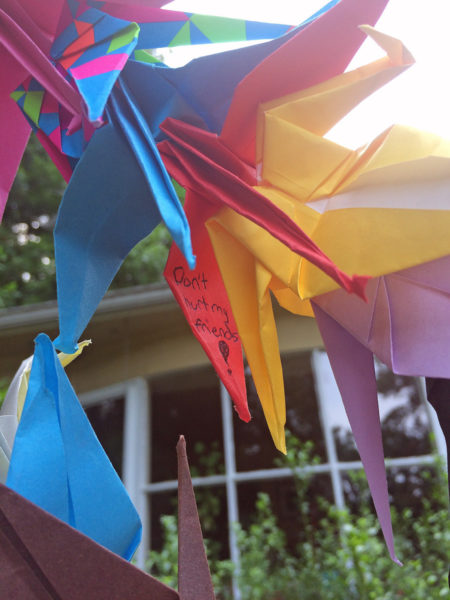
A rainbow garland, created in support for people of color during the summer’s white supremacy rallies, is made of origami cranes, each of which contains a message, such as this one: “Don’t hurt my friends.” For a potluck party, the garland hung outside the Charis house, an intentional community south of Charlottesville, Virginia. Photo: Amy Sowder/Episcopal News Service
“Police tear-gassed people, and we were downwind of it, wiping our eyes. It’s a very emotional time right now,” Aheron said as she and other Charis housemates gathered in the living room anchored by a velvety silver couch and matching chair. A megaphone sat atop a piano. Three counter-protest signs leaned against the fireplace. Each of the small paper cranes on the garland outside had written intentions to eradicate white supremacy in Charlottesville. One message peeked out from pink paper crane: “Don’t hurt my friends!”
Then, at the Aug. 12 rally, one young woman was killed and 19 people injured when a man associated with white supremacy groups plowed his car into counter-protestors. No one from Charis was injured, but Aheron and Charis guest Rowan Hollins were standing on the corner of the street where the attack happened.
White supremacists have since protested by the vigils and memorial services, and Heisey has helped with security, Aheron said.
“Everyone’s physically fine, but not emotionally. We’re pretty traumatized,” said Aheron, who had a dream that a white supremacist drove into her mother’s house. “No one in Charlottesville has been able to get rest. It’s not over, by any means.”
Smith, 48, doesn’t live at Charis, but she’s there often as part of the larger community participating in outreach. “These guys are putting themselves on the front line of this, all in Christian discipleship, so I accompany them and help provide a meditative grounded space,” Smith said.
A permaculture of many layers
Charis had quieter beginnings and practices, namely, permaculture as a guiding principle. For many, permaculture means closed systems of production, efficiency and high-intensity homesteading. Charis wants to apply these principles plus more.
Permaculture in general focuses on letting the land speak for itself. Rather than simply extracting products from a space of land, Charis members pay attention to the soil composition, needs of the plants and natural curvature of the land, which is assessed for best use. In their permaculture, the land has so much more to say, and that land carries memory. They call it “listening permaculture.”
“You usually hear this whitewashed, like a homestead Disneyland,” Aheron said. “But a lot of what we learned in growing processes came from indigenous people.”
Martha Morris, 30, has lived in the Charis community off-and-on since it began. After earning her graduate degree in urban and environmental planning, she became a stewardship assistant at the Virginia Outdoors Association. “I do like the land-based part of it, and that’s part of what drew me here,” Morris said about the community. “It fits into the larger philosophy of Charis, including outreach activities.”
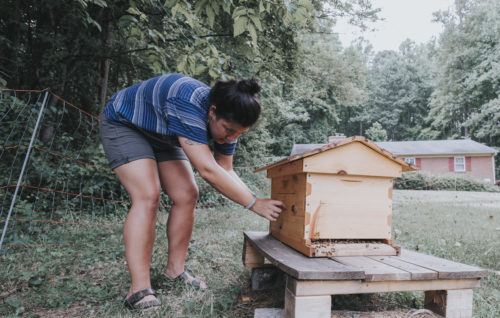
Charis cofounder Grace Aheron tends bees for honey farming, a sustainable practice that’s part of the permaculture values of this intentional community on Episcopal land. Photo: Eze Amos/For Episcopal News Service
For this community, that respect for the land means a plan to replace the lawn with a forest garden that will help them be as food self-sufficient as possible. Also called a food forest, a forest garden is a key part of permaculture. It’s a sustainable garden designed to produce the beneficial relationships that a natural plant-and-animal community has in that climate.
Morris is excited about what they can do: nurture indigenous, perennial plants including medicinal plants, herbs and fruit trees. They already have a garden yielding all sorts of produce: strawberries, Anaheim peppers, basil, large red tomatoes, little yellow pear tomatoes, Roma tomatoes, summer squash, parsley, prickly cucumbers, and summer squash. They have two beehives, and they’d also like to create a flower garden to serve the church’s cemetery.
In the basement, about a dozen 10-day-old fluffy heritage chicks hopped and pecked about in their wooden pen, warmed by a red light. These chicks aren’t fancy heritage breeds. “It’s about preserving the tradition of well-bred, healthy, old lines of animals, chickens not bred to get huge, lay tons of eggs and die young,” she said.
Behind the house, Heisey pointed to the ChickShaw, or mobile chicken coop, he built from wood and wire after the last flock was plucked off by predators. “Having chickens in one spot for only a limited time has an ecological benefit,” Heisey said. “By moving them regularly, they’ll have grubs to eat and fortify the soil.”
Other values
Integrated with permaculture are the values of simplicity, resilience, sustainable cultivation, responsible revenue generation, closed-loop systems and homesteading.
Composting is an easy example of a closed-looped system, using food waste to fertilize their food garden — instead of disposing of it. Worms found in compost are integral to the process.
“Worm poop is super good for nutrients, which is good for the soil,” Hitchins said as she riffled through the compost with gloved hands to expose the wrigglers. It’s a natural, and some say superior, alternative to store-bought fertilizer for gardening.
To some, living in this kind of community can seem idealistic. But it’s living with a deep awareness of the history of the earth and its people, in the spirit of Jesus’ teachings, Aheron said. That awareness transforms into action. And that action can have benefits expanding beyond these eight acres.
As the potluck party-goers tossed a Frisbee on the front lawn where lightning bugs pulsed in the darkening sky, Hitchins sat at the piano inside the house with a friend, creating a song:
“We are more than conquerors/
If we only believe another world is possible/
Victory is in our eyes/
I’m gonna stay on the battlefield until the day I die.”
— Amy Sowder is a special correspondent for the Episcopal News Service and a Brooklyn, New York-based freelance writer.

Social Menu